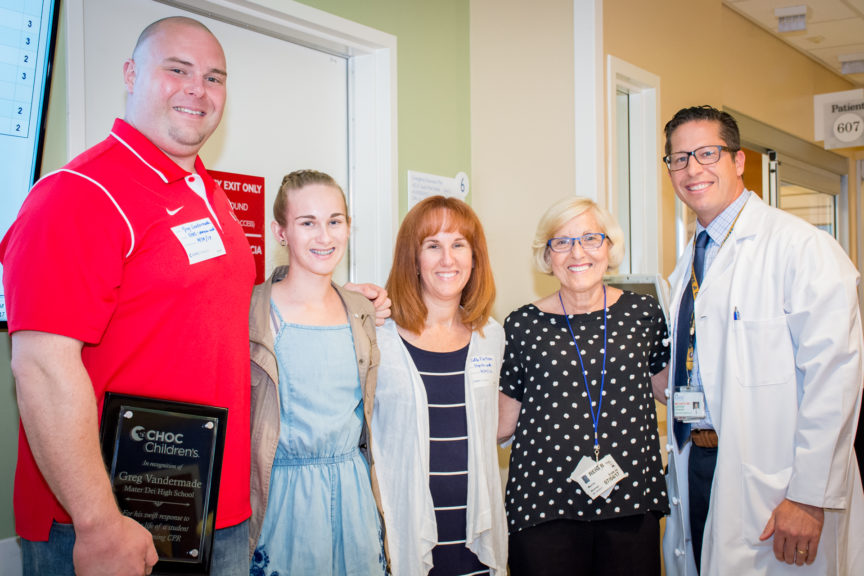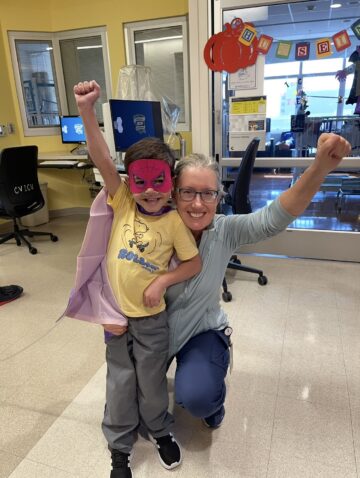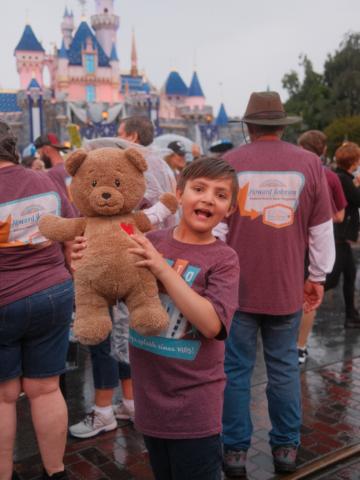After recently being discharged, Katie Flathom stopped by the CHOC cardiovascular intensive care unit (CVICU) again to make some introductions.
Suddenly, the 16-year-old has a group of heroes in her life: the coach who resuscitated her on school campus and the CHOC team that treated Katie for three weeks and will continue her care as she navigates life with a newly diagnosed heart condition.
During a recent athletic conditioning class in school, Katie collapsed and went into sudden cardiac arrest.
Her trained and quick-thinking conditioning coach snapped into action and resuscitated Katie with CPR until paramedics could arrive and transport her to CHOC.
“It was the longest 10 minutes of my life,” said Greg Vandermade, Katie’s coach at Mater Dei High School who also credits other students for alerting him to Katie’s condition and calling 911, as well as fellow staff who assisted by obtaining an automated external defibrillator (AED) to shock Katie’s heart into a normal rhythm.
At CHOC, Katie continued to have irregular heartbeats that required further defibrillation and cardioversion, procedures that help restore the heart’s natural heart rhythm, said Dr. Anthony McCanta, a CHOC cardiologist.
Katie also went on extracorporeal life support, a treatment that takes over the heart’s pumping function and the lungs’ oxygen exchange until a patient can recover from injury. This allowed the CHOC Heart Institute team to continue to treat her life-threatening arrhythmias with medication, Dr. McCanta said.
Dr. McCanta performed an electrophysiology study procedure and implanted beneath Katie’s skin a subcutaneous implantable cardioverter defibrillator, a device that helps prevent sudden cardiac arrest in patients.
After Katie’s discharge and further testing, she was diagnosed with Arrhythmogenic Right Ventricular Dysplasia, or ARVD. A rare type of cardiomyopathy where the muscle tissue in the heart’s right ventricle is infiltrated and replaced by fatty tissue and scar tissue, ARVD weakens the heart’s ability to pump blood and makes the heart susceptible to life-threatening arrhythmias.
The diagnosis also means Katie, a cross country and track athlete, will need to give up running for good.
“It was hard at first,” she said.
But instead of sitting on the sidelines, Katie’s decided to pick up golf, a sport that’s compatible with ARVD.
Katie has even begun incorporating a golf swing into her physical therapy sessions at CHOC, and she had two clubs in tow as she, her family and coach Greg visited the CVICU recently.

There, Dr. McCanta and the CHOC team presented Greg with a plaque recognizing him for his swift response and efforts that surely saved Katie’s life.
“Coach Greg responded to Katie with CPR on the spot and saved her life that day,” Dr. McCanta said. “His heroic actions, and those of Katie’s schoolmates and staff, including obtaining and appropriately using the AED, are the reason that Katie is alive today.”
Katie’s story underscores the importance of being trained in CPR and in the use of AEDs, Dr. McCanta said.
“Having AEDs in schools and training staff and students in CPR with an AED are some of the most important interventions that we have in saving lives of young people experiencing sudden cardiac arrest,” he said.
Getting AEDs installed in schools is among the goals of CHOC’s Life-Threatening Events Associated with Pediatric Sports – or LEAPS – program.
Coincidentally, Katie’s own grandmother, a nurse and health services coordinator in the Irvine Unified School District, has collaborated with LEAPS and helped get AEDs installed on her district’s campuses.
“Never did I think though that this would happen to one of my own family members,” said Marcia, Katie’s grandmother.
Get more expert health advice delivered to your inbox monthly by subscribing to the KidsHealth newsletter here.

Learn more about CHOC’s Heart Institute
CHOC Hospital was named one of the nation’s best children’s hospitals by U.S. News & World Report in its 2024-25 Best Children’s Hospitals rankings and ranked in the cardiology and heart surgery specialties.





